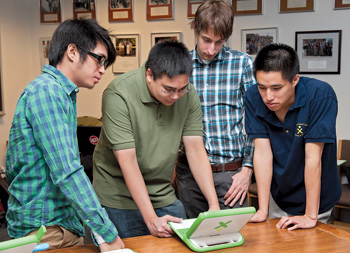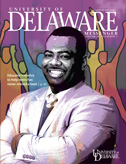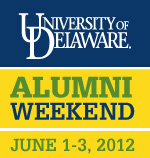Computer course much more than child's play

ON THE GREEN | Senior Bryan Mey understands that in order for kids to play a game, it has to be fun. He also knows that children are social by nature and enjoy playing games together.
These were some of the considerations that Mey and his teammates took into account when developing an interactive computer board game last semester as part of their Educational Games Development course in computer science.
Shape Shifters is a multiplayer learning game the UD students designed to teach fraction concepts to fifth- and sixth-graders at Chester (Pa.) Community Charter School (CCCS). As players correctly answer multiple-choice questions, their animated game piece bounces, slinks, flies or spins toward the finish line. Players earn a random number of moves for each turn, with extra spaces awarded for correctly answering probability questions.
"The social aspect [of the game] made it about competing with friends or helping friends learn, not just beating the game, which added a really unique factor to the educational portion of the game design," says Mey, a computer science major and Honors Program student.
His group was one of five student teams to showcase their gaming creations during the fall 2011 Educational Games Demonstration and Reception on campus. They are the fifth group of undergraduates to complete the course since 2009.
Developed by Prof. Lori Pollock and Assistant Prof. Terry Harvey, both of computer and information sciences, the course enables UD students to develop valuable technical and communication skills, while serving their community through interaction with the Chester school. The course is supported through a National Science Foundation Broadening Participation in Computing grant.
Each semester, UD students work with CCCS teachers to design custom computer games to help their students understand fractions, grid coordinates, order of operations and other important mathematical skills. They must consider the children's strengths and limitations, multiple learning styles and learning levels, as well as conceptually relevant ideas for the targeted grade level.
The student-created games run on XO laptops, small green-and-white computers developed by the nonprofit organization One Laptop per Child, which aims to create educational opportunities for the world's poorest children. The XO laptops have a range of up to eight kilometers, making them useful for children in remote areas and in locally underrepresented communities.
Introducing a service-learning component into a computer science course is a novel concept that Pollock says allows students to see a direct impact of working for an organization, rather than turning in a class project that may never be used.
"The most powerful learning moment in the course is when teams watch middle school students use their software," Pollock says.
Andrea Macartney, a Shape Shifters team member, calls the experience exciting. "You never know what a user will think of your game until you actually watch them use it," she says.
While math is a common theme in the games, the computational thinking concepts can also be applied to middle school science, language arts and social studies.
In addition to honing their software engineering skills, UD students gain interpersonal and team-building skills and learn to communicate with non-technical audiences.
As the course gains popularity on campus, it is also beginning to attract attention outside the University. A Microsoft researcher visited UD's Newark campus recently to investigate ways to use the group's games as a basis for teaching computational thinking.
Article by Karen B. Roberts, AS90






